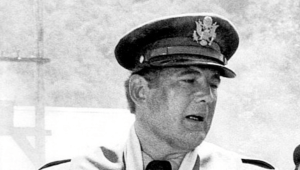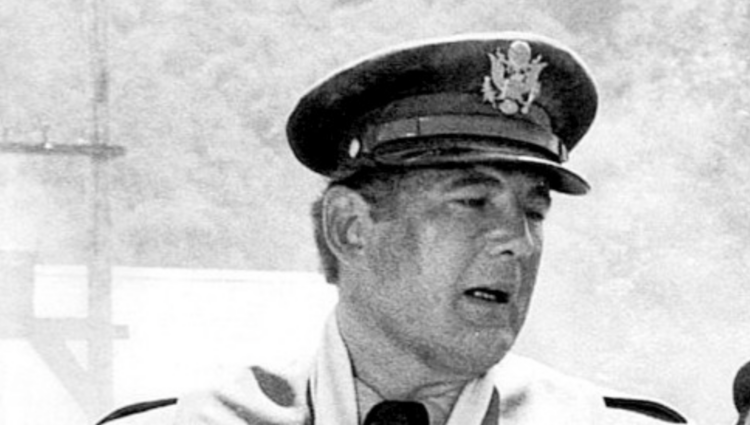M*A*S*H’s Dr. Winchester and the Chinese prisoners in the American camp find a common language in a single piece of music, written a century-and-a-half before: Mozart’s Clarinet Quintet.
 The final episode of the hit TV series, M*A*S*H aired on February 28, 1983, garnering an astounding 125 million viewers, the most in television history at the time for a single program. The show, set in an American Mobile Army Surgical Hospital (MASH unit) during the Korean War, ran for eleven seasons and told the stories of the doctors and nurses who performed grueling, heart-wrenching work just beyond the war’s front lines. The secret of the show’s success was its brilliant blending of comedy and pathos; though billed as a “situation comedy” (or “sitcom”), it was called more accurately a “dramedy” by some observers.
The final episode of the hit TV series, M*A*S*H aired on February 28, 1983, garnering an astounding 125 million viewers, the most in television history at the time for a single program. The show, set in an American Mobile Army Surgical Hospital (MASH unit) during the Korean War, ran for eleven seasons and told the stories of the doctors and nurses who performed grueling, heart-wrenching work just beyond the war’s front lines. The secret of the show’s success was its brilliant blending of comedy and pathos; though billed as a “situation comedy” (or “sitcom”), it was called more accurately a “dramedy” by some observers.
During the course of its run, the show explored the psychological makeup of each of its main characters, and the balance between comedy and drama increasingly tilted toward the latter as each season passed. Indicative of this shift in tone was the replacement of three of the show’s original protagonists with characters of more depth. Colonel Henry Blake (McLean Stevenson) was succeeded as camp commander by Colonel Sherman Potter (Harry Morgan) after season three; Captain “Trapper” John McIntyre (Wayne Rogers) gave way to Captain B.J. Hunnicutt (Mike Farrell) at the same time; and the bumbling, militaristic Major Frank Burns was replaced by Major Charles Emerson Winchester (David Ogden Stiers) after the show’s fifth season.
Winchester was a much more imposing and multifaceted figure than Burns. A snobby Boston Brahmin who usually exuded a disdain for those around him, he was a skilled surgeon and an intellectual heavyweight. Though his profession was medicine, his real passion was classical music, and several episodes of M*A*S*H involved plotlines centered on Winchester’s passion for music. (Actor Stiers is also a professional conductor who has led ensembles across the globe.)
The most moving of these stories came in the show’s famed final episode, “Goodbye, Farewell, and Amen.” With the war winding down at last, a sick Winchester is taking a walk some distance outside the camp’s boundaries when five Chinese soldiers accost him. Fearing he is about to be shot, Winchester cowers in fear until the soldiers produce musical instruments hidden in the motorcycle and side car in which they had been riding. “My God, they’re musicians,” Winchester exclaims. The quintet strikes up both Chinese and American popular tunes, which grates on the snooty Winchester. They proceed to follow the American doctor back to camp, surrendering themselves.
Once back at the MASH unit, the Chinese musicians are secured in a hastily-constructed wire enclosure, and they continue to play raucously as Winchester, sitting in his tent, attempts to listen to classical music on his record player. Perturbed, the doctor storms over to the Chinese prisoners and shouts at them to desist. Speaking no English, they do not understand what the American is telling them until Winchester, who also speaks no Chinese, finally says in exasperation, “I am trying to listen to MOZART.” A look of recognition and awe comes over the faces of the musicians: “Ah, Mozart!” As Winchester turns to go back to his tent, the leader of the group plays on his flute the sublime main theme of Mozart’s famous Clarinet Quintet. Winchester stops in his tracks, a look of wonderment on his face.
Winchester then attempts to teach the Chinese musicians the Clarinet Quintet in its entirety, conducting them in his free time in the camp’s mess tent. Too soon however, the prisoners are loaded onto a truck by American military police in order to prepare them for a prisoner exchange. Winchester pleads with the MPs to let the men stay: “You can’t. Not yet. I’ve come too close to stop now!” As the truck pulls away, the Chinese musicians serenade Winchester with an excellent rendition of the first part of the Quintet. The surgeon, who maintains an emotional reserve even with his long-time American comrades, tears up and waves goodbye forlornly to these men, technically his enemy, whose only common language is a single piece of music, written a century-and-a-half before by a man born in Salzburg.
A short time afterward, wounded prisoners of war are brought to the MASH unit. As Winchester examines one dying Chinese soldier, he suddenly notices that the man is the leader of the quintet. “Oh God, no,” Winchester moans. “He wasn’t even a soldier. He was a musician.” A medic tells Winchester that the man’s four comrades are already dead. The stunned doctor makes his way to his tent to gather himself, putting on his record player a recording of Mozart’s Quintet as a balm. But upon hearing the opening strains of the Quintet’s main theme, Winchester pulls the needle off the record and smashes the vinyl album over the player. The horror of war has turned even this thing of absolute beauty into an ugly reminder of death—meaningless, undeserved, untimely death. Like the Devil from which its evil springs, war warps the good, the true, and the beautiful. At the episode’s conclusion, we the viewers are left to consider whether in Doctor Winchester’s soul the Gates of Hell will prevail over the memory of the beauty that the American doctor, the Chinese musicians, and the young man from Salzburg created together.
This essay was first published here in March 2014.
The Imaginative Conservative applies the principle of appreciation to the discussion of culture and politics—we approach dialogue with magnanimity rather than with mere civility. Will you help us remain a refreshing oasis in the increasingly contentious arena of modern discourse? Please consider donating now.
The featured image (detail) is a photo of David Ogden Stiers as Major Charles Winchester, and is in the public domain, courtesy of Wikimedia Commons.


